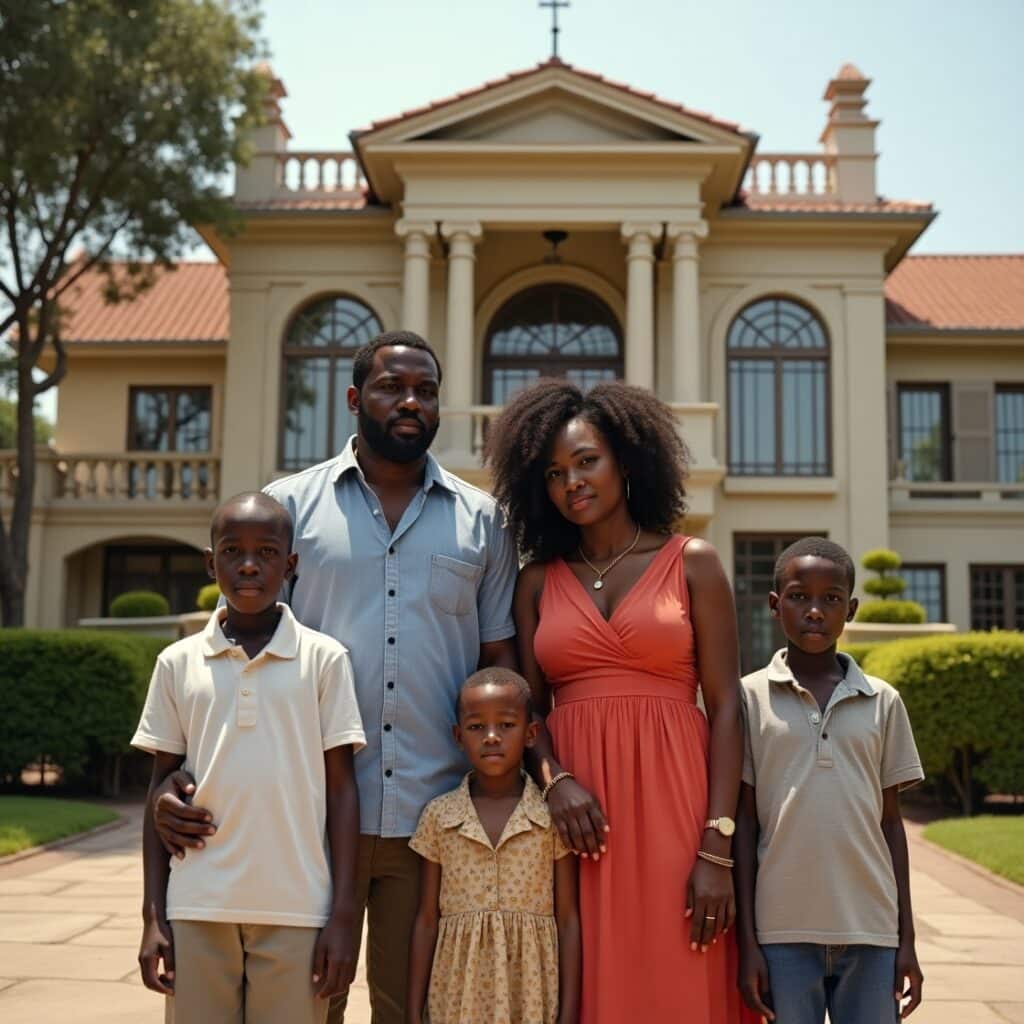Every now and then, Nigerian social media reminds us just how deeply personal and culturally loaded the question of “next of kin” is. It resurfaces in waves, sometimes as innocent banter, other times as tearful confessions or viral stories that hit too close to home. It might start with a tweet or a TikTok video, but soon it exposes real cracks in the foundation of many African families. And if you’ve been paying attention recently, you would have seen the gripping video of Ifunanya, a young American-Nigerian woman who journeyed all the way to Nigeria to rescue her ailing father from the hands of his own siblings.
This is not just a story of a brave daughter. It’s a mirror held up to our society, reflecting the painful truths we’ve normalised around family, inheritance, and who we really consider as “ours” when the chips are down.
In many African societies, particularly in Nigeria, inheritance follows a rigid and deeply patriarchal framework. The male child is typically the heir, and the wife, no matter how long she has stood by her husband, is often treated as an afterthought. This cultural logic, sadly, bleeds into our everyday choices, including who we list as our next of kin in banking, pension, and employment forms.
Time and again, we hear of men who name their brothers or uncles as next of kin, skipping their wives entirely. And they do so not because their marriages are broken, but because they have been conditioned to trust their siblings over their spouses. It’s a choice that might seem harmless until life happens.
This kind of thinking alienates spouses and destabilises the very families these men claim to protect. It communicates distrust, prioritises extended relatives over one’s immediate family, and sets the stage for bitter conflicts should anything happen.
Ifunanya’s Viral Video
Ifunanya’s story is a textbook example of what happens when cultural norms go unchecked. Her father, a retired U.S. worker, like many others in the diaspora, chose to return to Nigeria after retirement, likely envisioning peace, home-cooked meals, and reconnection with his roots. Instead, what awaited him was betrayal.
Cut off from his nuclear family in the U.S. (his wife and children), he was left to suffer in silence. His pension was allegedly diverted by his siblings while he battled stroke, dehydration, malnourishment, and high blood pressure. The very people who should have protected him weaponised his vulnerability. And when his daughter came to rescue him, his siblings fought her, not out of love for their brother, but because they feared losing access to the money that came with him.
The most horrifying part of the story wasn’t just his medical condition; it was the revelation that his own siblings, supposedly educated individuals, one of whom lives in the United States and is even married to a Caucasian, were actively resisting all efforts to free him. These were not unexposed, uninformed villagers. These were people who had seen the world and should have known better. Yet they were deeply invested in his captivity. Why? Because in their eyes, his wealth was a communal resource for the extended family, while his wife and children in America were outsiders who had no business interfering.
They fought Ifunanya’s intervention not because they loved their brother, but because they feared losing access to his money. That tells you everything you need to know about how warped our understanding of kinship has become.
This story hit home for me. I have witnessed firsthand the cruelty that relatives can unleash when they feel entitled to another person’s life and property. It’s always the same story: greed masked as love, entitlement disguised as loyalty. I have seen homes shattered, wives humiliated, and children pushed aside, all because some aunt or uncle believed they had more right to a man’s legacy than the family he built.
What It Really Means to Name a Next of Kin
Let’s get one thing straight: naming someone as your next of kin on paper does not automatically give them legal authority over your estate. It simply means that in the case of an emergency or your death, they are the first person to be contacted by the institution involved, be it a hospital, employer, or financial institution. However, many people confuse this designation with inheritance rights, which can lead to serious misunderstandings and unnecessary drama.
In Nigerian law, when someone dies without a will (intestate), their estate is administered according to a specific order of priority under the Administration of Estates Law. That order typically follows this sequence:
- Spouse
- Children
- Parents
- Siblings
- Grandparents
- Creditors
- Administrators appointed by the court
So, technically, your siblings can only inherit after your spouse and children have either been provided for or are no longer in the picture. If you have a surviving wife and children, they are the primary legal beneficiaries, not your brothers, sisters, or uncles, regardless of who you listed as your next of kin.
This is where the danger lies. In the absence of a will, especially when a man has written his sibling as next of kin in financial documents, relatives often interpret that as a green light to claim the deceased’s assets. But legally, that next of kin status does not supersede the statutory order of inheritance. It doesn’t grant control over bank accounts, property, or pension benefits unless they are specifically mentioned in a valid will or are legally appointed as estate administrators.
Unfortunately, without proper documentation and awareness, greedy or opportunistic relatives can use that next of kin designation to pressure institutions or even mislead less informed spouses and children. This is why having a will and discussing your estate plans openly with your nuclear family is not optional, it is essential.
A name on a form can only go so far. What truly secures your family’s future is legal clarity backed by documentation. Yet, without clear documentation, greedy relatives can manipulate systems, intimidate widows, and steal from grieving children.

The Importance of Writing a Will
This is why having a legally binding will is not just a smart move, it’s a necessary act of love and responsibility. Life is unpredictable. Accidents happen. Illness happens. Death happens. And when it does, we must not leave our loved ones at the mercy of cultural interpretations and entitled siblings.
A will is the only document that clearly spells out who gets what, when, and how when you’re no longer around to make those decisions. It does more than just divide property; it creates order in a time of emotional chaos. It ensures that your loved ones are not left confused, vulnerable, or at the mercy of entitled relatives who believe they can override your wishes with tradition or noise.
When you die without a will (intestate), the state decides how your estate is distributed, often in a way that doesn’t reflect your actual intentions. The legal process can become long, expensive, and emotionally draining, especially if multiple family members begin to make claims.
But with a will:
- You name your beneficiaries. No confusion. No assumptions. Your spouse, your children, or anyone else you care about is clearly listed and protected.
- You appoint trusted executors. These are the people who will carry out your wishes, distributing assets, paying off debts, and making sure everything runs smoothly.
- You reduce tension. A well-drafted will minimizes family conflicts. It leaves little room for disputes because your intentions are written and legally recognized.
- You can provide for minor children. You can name guardians, secure their education funds, and ensure their future is safe.
- You can protect your spouse. Especially in a culture where widows are often sidelined or stripped of property, a will serves as a shield.
Let’s be honest, no one likes to talk about death. It feels heavy, superstitious even but avoiding the conversation doesn’t stop the inevitable. What it does is leave the people you love most in a vulnerable position when the time comes.
A will is not a death sentence. It is a declaration.
This is what it says: I see you. I value you. I’ve thought about your future. I’m not leaving you in the dark. I’m not handing you over to the mercy of relatives who were absent when life was hard but now show up with open hands.
If you truly care about those you’ll leave behind, don’t just hope they’ll be okay. Plan for it. Write it down. Legalize it. Let your will speak for you when you no longer can.
Choose Your Nuclear Family
Men, especially, must begin to understand the importance of choosing their nuclear family. Your wife is not your housemate. Your children are not accessories. They are your first responsibility. If your siblings truly love you, they will respect your marriage, your boundaries, and your choices. They will see your wife and children as extensions of you and treat them with the dignity they deserve.
And if they don’t? Then boundaries must be drawn; firmly, clearly, and without guilt.
That might look like:
- Making it clear that your nuclear family comes first in your financial, emotional, and spiritual priorities.
2. No longer entertaining disrespect or gossip about your spouse.
3. Refusing to let your home become a battleground for family politics.
4. Having honest, sometimes uncomfortable conversations that reestablish what is and isn’t acceptable.
Protecting your nuclear family does not mean abandoning your roots. It means watering the tree that bears fruit today, not just the one that sheltered you yesterday. Some men grow up never seeing this modeled. They saw their fathers defer to their uncles. They saw their mothers humiliated by in-laws. And now, unknowingly, they repeat the same pattern. It’s time to break the cycle.
No one is asking you to abandon your siblings. Far from it. But generosity without boundaries leads to abuse. Help them, yes. Support them, absolutely. But never at the expense of your home. Your primary duty is to the people under your roof. Let them know where your loyalty lies. Let them know where to stop.
Usually, this entitlement is planted in the soil of unchecked disrespect. A man allows his siblings to talk down on his wife. He laughs. He brushes it off. He allows little insults to fester until hatred takes root. Some men even unknowingly pit their families against their wives. And when that happens, the children grow up witnessing this tension. Some of them internalise it. Others grow resentful. And a house divided begins to crumble.
In this post, you’ll notice that I keep addressing men, calling them out, urging them to choose their nuclear family, challenging them to write wills and set boundaries. That’s not because women don’t also need to make these decisions. Nah. Everyone, regardless of gender, should take estate planning seriously. But the reason I keep returning to men in this discussion is because, as I mentioned earlier, we live in a deeply patriarchal society, and in most of the real-life cases we see, including the one that inspired this post, the patterns of neglect, misplacement of loyalty, and harmful next-of-kin decisions overwhelmingly involve men.
That said, I am fully aware that not all situations are the same. There are men who find themselves in complicated or painful marriages. Some genuinely need the intervention of siblings or extended relatives for protection or balance. Life is layered, and I don’t pretend that this issue is one-dimensional.
However, this particular post stems from a very specific angle, the side revealed through Ifunanya’s viral video. That’s the lens I’m using to reflect on broader cultural habits. It’s not the whole story, but it’s a necessary part of it.
Back to Ifunanya…
Beyond her bravery, what struck me most about Ifunanya was her poise. Here was a young woman who left her job and comfort in one continent and came to do battle in another continent where she had no power, no backing, and no legal leverage.
She fought chaos with calm. She confronted abuse with grace. She didn’t need to raise her voice to be heard, her presence alone carried weight. That is true power. Quiet confidence doesn’t clamour for attention; it holds its ground and changes the atmosphere. In a world where noise is often mistaken for influence, Ifunanya’s strength was deliberate, steady, and thunderous in its stillness.
What moves me even more is that she held this story close to her chest, until the time was right. Until her father healed. Until her family healed. Until she was ready. And she shared it not for clout, not for validation but for the awareness and knowledge. That kind of restraint, that kind of emotional maturity, utterly humbles me.
Even more beautiful was her faith. In a generation that often hides their belief in God, she boldly affirmed the role of the Holy Spirit in her journey. She gave credit to divine guidance. She stood firm in faith and mission. That’s rare and it’s worthy of all the applause.
While listening to her, I sensed that there may be a chasm between her parents. Perhaps they are no longer together. Perhaps they have unresolved differences. I don’t know. But even in that possible tension, she chose to show up. And that’s a message to all parents: no matter what happens between you, your children should always feel emotionally safe with both of you. Stay connected with your children (child).
Do not let marital issues erode the relationship your children have with either parent because when the chips are down, it is those very children who may become your only defense against a cruel world.
The next of kin conversation should no longer be an online cruise topic. It should be a wake-up call. We must unlearn harmful practices. We must confront the cultural rot that prioritises siblings over spouses and fuels unnecessary rivalries.
We must:
- Write wills
- Educate our partners and children about our finances
- Set boundaries with relatives
- Redefine loyalty
- Protect the family we build
Ifunanya’s story should not be another episode we forget in a week. It should move us to action. To think more deeply. To live more consciously. To plan for the ones we love. If you truly love your family, you won’t leave them behind. You’ll make sure they come first: on paper, in practice, and in spirit.
So ask yourself again: Who is your next of kin? And more importantly, Does your choice reflect your truth?
What has been your experience or your thought on this? I’ll love to hear it in the comments.
Stay frosty.




